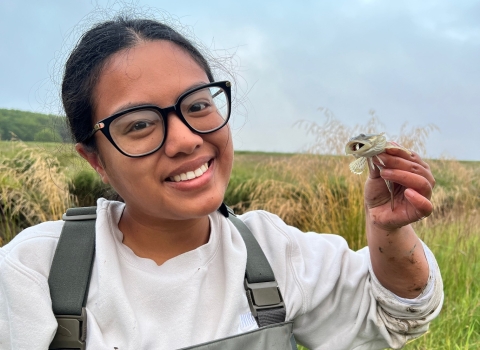To the uninitiated, they simply look like rocks in a creek bottom. The inconspicuous outward appearance of freshwater mussels belies all the beauty within of how they live. A gathering in Austin, Texas, on November 14 and 15, 2017 punctuated the point that mussel conservation is important to Texans.
We, along with the Texas Parks and Wildlife Department (TPWD) and the Office of the Texas Comptroller of Public Accounts, hosted the first-ever Texas Freshwater Mussel Conservation and Stakeholder Summit. The Summit gathered an assortment of scientists and other professionals from across the country knowledgeable about mussel conservation. The meeting provided a forum for those who have designed mussel conservation programs to share with all what has worked for the betterment of these wonderful animals.
The Service’s Southwest Regional Director Amy Lueders and Tim Birdsong, Chief of Aquatic Habitat Conservation for TPWD keynoted the event. Both leaders spoke to the fact that conservation succeeds through collaborative stewardship. “Water is key to a thriving economy and communities and healthy fish and wildlife populations,” said Regional Director Lueders. “In a state like Texas with an ever expanding population, periodic droughts, and occasional floods, managing this resource can be a challenge and our success will be based on collaboration and coordination.”
The Summit was well-attended by an audience who heard from 24 invited speakers. The event’s sessions focused on freshwater mussels in Texas, particularly mussel survey designs; relocation protocols; captive rearing; water quality and stream flows; and private landowners and stakeholder programs useful in conserving mussels.
Stakeholders from Central Texas comprised much of the audience: university researchers, state and federal agency biologists, conservation NGO and municipality and river authority representatives. Attendees heard repeatedly that coordination among researchers and agency staffs, coupled with long-term monitoring of rare but persistent mussel populations are essential matters going forward. Austin Ecological Services Field Office biologists intend to convene an informal working group in 2018 to further mussel conservation in Texas.
Texas is home to more than 50 mussel species, 12 of which are unique to the state. Nationally, nearly 75 percent of mussel species are afforded state or federal protection due to declines in their numbers. In 2009, TPWD added 15 mussel species to its threatened list. In August 2016, the Texas hornshell (Popenaias popeii), found naturally only in the Rio Grande basin in New Mexico and Texas, was proposed for listing by the Service. The conservation status of another seven mussel species native to Central and East Texas rivers is currently under review by the Service, with recommendation expected over the next two years.
The summit coalesced ideas and passions that will prove essential for mussel conservation, whose populations fall within the Region’s East Texas-East Oklahoma Emphasis Area.



